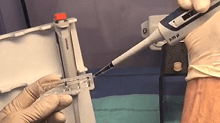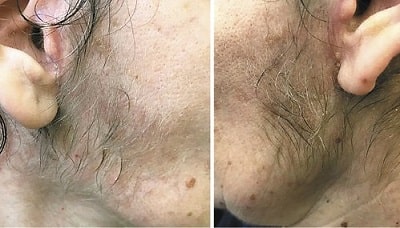I have written numerous posts in relation to fat cells (adipose tissue) and hair growth. There is clear evidence that adipose-derived stem cells (ADSC) on the scalp impact hair growth. The latest trend at hair clinics entails combination nanofat and platelet-rich plasma (PRP) hair growth treatments. Note that instead of nanofat, some also use the term microfat transfer or grafting.
Update: October 2021 — Emerging role of dermal white adipose tissue in modulating hair follicle development during aging.
Nanofat Injections for Hair Growth

During several of last year’s hair loss conferences, a number of presentations entailed nanofat injections into the scalp. Some use the term Autologous Lipocyte Micronized Injection (ALMI) for this procedure.
Most of these fat and adipose-derived stem cell related topics are classified under “stem cell” treatments for hair loss. Note that adipose-derived stem cells (ADSCs) are mesenchymal stem cells (MSCs)
Nanofat injections have been used for many years when it comes to regenerative medicine applications. Usage in hair loss sufferers is more recent. A 2020 study from China found human-derived concentrated nanofat promoted hair growth in mice. The mechanism of action entails activation of dermal papilla cells via the Wnt/β-catenin pathway. Also of interest, a clinical trial from China that tested nanofat grafting for treating androgenetic alopecia ended last year. I am guessing that the results will be published this year.
Perhaps the first study to find benefits from nanofat in male pattern hair loss sufferers came from Italy in 2017. These gains in hair growth lasted even 12 months after initial treatment. The fat was obtained via liposuction using the Tulip Nano device. Also from Italy, Dr. Piero Tesauro is a leading practitioner of nanofat transplantation.
In the US, doctors are increasingly offering combination treatments that include PRP and nanofat. According to Dr. Cheryl Karcher:
“When nanofat is used for hair restoration, she injects it first. She then injects the patient’s PRP on top of it to act as a fertilizer for the nanofat.”
However, in the same article, Dr. Robert Singer warns that there is as yet no safety or efficacy data surrounding nano-fat treatment for hair growth. It should be noted that the somewhat related SVF/Kerastem treatment has shown promising results.
Dermal Adipose Tissue Promotes Hair Growth and Pigmentation
Also of interest, a January 2021 study found that dermal adipose tissue secretes hepatocyte growth factor (HGF). This in turn promotes both human hair growth and hair pigmentation. Among the co-authors of this paper include Dr. Ralf Paus (see Monasterium) and Dr. Maksim Plikus (see Plikus Lab).
What was especially interesting to me in this new 2021 paper was a link to a 2019 paper. Apparently, autologous fat grafting to the face can in rare instances lead to unwanted hair growth (hirsutism). Further evidence of the connection between adipose cells and hair cells.
